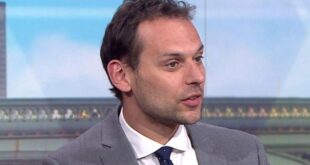Speaking the previous week, Mark Corner, YDNPA’s member champion for the natural environment, referred to the need for climate mitigation, and accessibility, which underlie that statement.
During the long campaign to save the Settle-Carlisle line in the 1980s – and in the years afterwards – National Park officers and members were very supportive of bus and rail projects.
And, significantly, supportive with practical resources – including financial resources.
However in the 1980s (and almost up to the Millennium), the National Park was a department of North Yorkshire County Council, operating under the umbrella of the county’s statutory responsibilities for public transport.
All that changed when, in 1997, the YDNP became an independent authority – YDNPA – with its own statutory purposes but no formal responsibility for public transport.
Yet there is a great deal that the YDNPA might do now, within the framework of decisions last year on aspects of climate change, greenhouse gasses and carbon reduction – combined with the authority’s reach into the public domain.
For example, public consultation is ongoing, with the text of the YDNPA’s Local Plan 2023-2040 now in preparation, to be followed by revision of the current YDNPA Management Plan.
There may also be new opportunities to share experiences and pool ideas on best practice (or otherwise) relevant to travel into and within national parks.
Should YDNPA make common cause with North York Moors National Park, bearing in mind that their statutory purpose of access and recreation is dependent for much of the weekend public transport on the fates and fund-raising of two voluntary organisations, DalesBus and MoorsBus?
Will the YDNPA consider setting up a public transport forum, with a role for knowledgeable users, including experienced volunteers from DalesBus, MoorsBus, the Friends of the Dales and others?
Ruth Annison, Askrigg, Leyburn.
Privatisation
TWO weeks in a row now the D&S Times has published complaints from users of Royal Mail.
Personally, whether using my local post office or receiving mail, the service here stands up to scrutiny.
If however services in other areas are dropping, perhaps reasons ought to be sought.
Money makes the world go around apparently, but a lot depends on where that money is thrown as to how it affects people and services, including Royal Mail. In November, just five months ago, it was reported since privatisation, £1.9bn has been shelled out to shareholders.
That’s 1.9bn reasons why privatisation should never have happened, and 1.9bn reasons for voting for a party that will renationalise the Royal Mail in the 2024 elections.
If we want improvements, get up to your polling station next year and do something about it.
Richard Baker, Middleton-one-Row.
Poor service
I WOULD like to reiterate the comments made by your correspondent about the postal service in Northallerton (D&S Times letters, Mar 31).
Like her mother, my in-laws were waiting for a card from the Palace last week for their 65th wedding anniversary but it arrived a day late despite having been posted in good time.
This is typical of the service they receive – letters posted each week first class in Darlington arrive five or six days late and many times they have no post for days on end but a large bundle of letters arrives at the end of the week.
Can nothing be done to restore our postal service to what we pay for?
Ian Smithson, Northallerton.
Council priorities IT was excellent news that Harrogate Borough Council was abolished on April 1.
In one of their last acts the councillors tried to waste £50m on a conference centre refit, confirming why the council needed to be scrapped.
Anyone would think the conference centre had burnt down and wasn’t insured. But it’s still there.
There are many important uses for council tax that residents need – such as providing more social housing, more teachers to reduce class sizes, more council care home places to free up beds in hospital, a new northern and western outer ring road to relieve traffic congestion, and many others.
A new Harrogate Town Parish Council will be elected next year. It needs 19 Independent councillors to stand up for residents, instead of pushing a “party line”.
Christopher Barker, candidate for Harrogate Town Council 2024, Central & Valley Gardens Ward, Harrogate.
A real character
PETER FREITAG, whose funeral took place last week, and I were friends and Liberal Party colleagues for several decades. He was a real character with never-ending tales of his exploits in sport, business and politics.
As an estate agent he had an advertising board at Feethams, opposite the main stand. During matches he would stand next to his advert. When the ball came his way, he would catch it and pause for a moment to let the crowd know who he was before throwing it back.
A keen participant in various sports, he would say: “I played junior and senior Wimbledon, I just missed the one in between!”
We were both elected to Durham County Council in 1973, Peter some weeks later as his election had been postponed due to the death of a candidate. It is a mark of the respect we had for Peter that we waited for him to join us before electing our new group leader – Peter, of course.
I am convinced that if Peter had been our candidate in the 1983 by-election he would have won. But Darlington had been given to the newly formed SDP to fight under agreement with the Liberals. The SDP fought a poor campaign and finished third after starting out as favourites.
Peter did a great deal for various causes. So much so that when he was awarded MBE in 2015 the citation did not mention politics at all. Peter had many faults (don’t we all?) and was not everybody’s “cup of tea”, but he was always a loving husband and father.
I can’t think of Peter without a smile coming on, and I’m sure there are many others who feel the same.
Chris Foote-Wood, Barnard Castle.
Safe passage
THE proposal by Tim Loughton MP to provide safe passage for 20,000 refugees a year raises interesting questions.
What is the number of such places that would be needed to stop the rubber boats on the basis that all their potential passengers have switched to a safe route?
I think we can assume that the profit margin for the people traffickers is wide enough that, were they to be losing custom, they could comfortably drop their prices to maintain and even increase demand for their services.
The number needed isn’t actually as high as the billions globally for whom the UK poverty level would represent a substantial improvement in living standards. But it is a number large enough to depress living standards here to a level no more attractive for potential migrants than other host countries open to them or their country of origin.
On the other hand, safe passage could be part of a plan to stop the boats on the basis that they do not offer what the passengers wanted: settlement in the UK and free access to its economy. In this case safe passage does not directly cause the boats to stop.
It is a psychological crutch, steeling us to the firm measures required to remove the incentive for coming. It is a sop to the sentimental.
It may, however, be instructive to consider who we would choose if admitting a strictly limited number of people.
I suggest they would almost all be women. These are clearly the most downtrodden of people, particularly in the countries from which most asylum claimants are coming.
Unfortunately, the question of Britain making its appropriate contribution to alleviating poverty and danger experienced by people around the world has been translated in the public mind into one of resettling a necessary tiny proportion of these people here.
This shows profound indifference or wilful ignorance regarding the actual problem, which proposals for migration barely scratch the surface of.
John Riseley, Harrogate.
More consultation
DURING the Christmas and New Year holiday period residents in north east Darlington had to give up their holidays to read a detailed Design Code for Skerningham Garden Village and send their responses on it to Darlington Borough Council by early January.
The responses were subsequently set aside at a Cabinet meeting when the Design Code was delayed because it felt that it fell short on key objectives and to give more time is given “to consult and to effect changes”.
Within the last week the local residents association has been informed by the cabinet member for economy that the Design Code is due to be considered by Cabinet in June and at present there are no plans for any further public consultation on it which flatly contradicts the information given earlier to residents.
In addition, the MP for Darlington stated in a letter to me “moreover Darlington Borough Council has announced that the Design Code has now been halted and agreed to a further public consultation”.
I raised the contradictions with the assistant director, economy and sited point 12 of the Government’s Garden Communities Prospectus which clearly states its commitment that local communities must have a meaningful say in developing the proposal from design to delivery.
The assistant director responded that “the Design Code has been through extensive consultation and this process meets the requirements for public involvement”.
This demonstrates that decisions of democratically elected councillors have been ignored and another public consultation on the Skerningham Design Code will not be held despite the fact that borough councillors and the town’s MP have given that commitment to hold a further consultation.
It is profoundly undemocratic and sets a very dangerous precedent which has understandably resulted in confusion and anger in north and north east Darlington.
I am therefore writing to ask the officers responsible for the Design Code to honour the commitment given by elected councillors and the town’s MP and hold a further Skerningham Design Code public consultation.
Alan Macnab, Darlington.
Housing ladder
HAVING just watched Thursday’s ‘Question Time’ (Mar 30) on BBC1 in which a question was raised by a 25-year-old clinical scientist concerned that she will never be able to afford to buy a home of her own as, having to pay rent on her present accommodation, she is unable to save for a deposit.
The problem is often raised but, as usual receiving plenty of sympathy, no one including from the panel asked her if she was attempting to buy on her own or with a partner to share the cost. The present younger generation are not being singled out over house buying. In the 1960s when I began dating my girlfriend (now my wife), I had no chance even then of buying our own home until my future wife (from 1971) was able to have 25 per cent of her salary added to mine to qualify us to obtain a mortgage.
Until we were married we continued to live individually with our respective parents which enabled us to save together for the deposit.
Obviously, there are times when people in similar circumstances are unable to live at home but governments cannot be expected to solve the problems of everyone wanting to buy a property.
Even in the 1960/70s it usually needed, unless particularly wealthy, two people together to buy.
A further reminder of difficulties experienced then was a 15 per cent interest rate for a period of time in the 1970s!
Mike Taylor, Darlington.


